Why Regular Hot Water System Maintenance Matters
Have you ever hopped into the shower only to be met with a burst of icy water? Or maybe you’ve...

Have you ever hopped into the shower only to be met with a burst of icy water? Or maybe you’ve noticed strange rumbling sounds coming from your hot water system at unexpected times? These small annoyances can point to bigger underlying issues in your hot water tank. They’re also a reminder of why regular hot water maintenance is so important.
Getting into the habit of scheduling hot water system servicing can save you time, money, and frustration. You’ll typically spot problems early and fix them without turning a straightforward issue into a major repair. Plus, keeping everything in great shape prolongs your system’s lifespan, ensuring you continue to enjoy cosy hot showers even during cold winter mornings.
In this blog post, we’ll cover the ins and outs of hot water system maintenance. We’ll look at the different types of hot water systems in Australia, address common misconceptions about “Do hot water systems need servicing?”, and share essential tips for both gas and electric setups. By the end, you’ll understand why regular hot water tank maintenance a must is and feel confident about keeping your system in peak condition.
Understanding Hot Water Systems
Hot water systems are a household staple in Australia. Whether you’re taking a morning shower, washing dishes, or doing laundry, you rely heavily on that constant supply of heated water. But how exactly does a hot water system work, and what sets one type apart from another?
Benefits of Regular Hot Water Maintenance
1. Improved Efficiency and Reduced Energy Bills
Who doesn’t like saving a bit on electricity or gas bills? Routine hot water maintenance ensures the tank is free of excess sediment, allowing heat to transfer more effectively. A clean, well-maintained system doesn’t have to work as hard, meaning it uses less energy overall. Plus, keeping the heating mechanisms in top condition stops any energy leaks or wasted fuel.
2. Extended Lifespan and Reliability
Just like a car, a hot water system lasts much longer with consistent care. By flushing out sediment, inspecting the anode rod, and checking all valves, you help prevent rust and keep key parts from wearing out prematurely. The result? A system that runs more reliably and can last well beyond its standard service life.
3. Ensuring Safety and Preventing Hazards
Hot water systems involve high temperatures and, in some cases, gas lines. If something goes wrong, it can create dangerous situations, like bursts of hot steam or gas leaks. Regularly testing safety valves, verifying proper ventilation, and ensuring everything is secure helps you avoid these hazards. Even a small step like a quick gas water heater maintenance check can make a big difference to the safety of your household.
Hot Water Tank Maintenance Essentials
1. Visual Inspection for Leaks and Rust
Begin each hot water tank maintenance session with a simple visual check. Look at the exterior of the tank for rust or discolouration, as these can be signs of internal corrosion. Keep an eye on any wet patches around the base of the tank.
2. Checking the Pressure Relief Valve
The pressure relief valve is a small but vital component. Its job is to release extra pressure when the water inside the tank gets too hot or expands too much. Test it by gently lifting the valve handle and then letting it snap back. If water drips for a few seconds but stops, it’s doing its job. If it keeps dripping or refuses to move, you may need professional hot water system servicing.
3. Cleaning the Hot Water Tank (Flushing Sediment)
Sediment build-up is normal, especially in areas with hard water. Unfortunately, over time, this can reduce your tank’s heating capability. Cleaning the hot water tank involves draining the unit, flushing out the sediment with fresh water, and then refilling it. Doing this once or twice a year keeps your system efficient and helps prevent unpleasant noises like popping or rumbling.
4. Inspecting the Anode Rod
Within the majority of tanks is a lengthy metallic bar referred to as an anode. It is intended to draw in corrosive substances in the water, stopping them from eroding the tank. Periodically remove the rod to check if it’s worn down or covered in rust. If it’s heavily corroded, replace it. This simple job is one of the best ways to extend your tank’s service life.
Warning Signs You Need Hot Water System Servicing
1. Unusual Noises or Rumbling Sounds
A hot water system should operate quietly. Loud knocks, bangs, or rumbling noises often mean sediment has built up inside the tank, creating pockets where steam bubbles pop and explode. Cleaning the hot water tank typically fixes these noises, but don’t ignore them. Prolonged neglect might lead to more serious damage.
2. Fluctuating Temperatures or Low Pressure
If your shower can’t keep consistent heat, or if the tap flow feels weak, it might be time for hot water system servicing. Issues such as a faulty heating element, a malfunctioning thermostat, or a clog in the pipes could be to blame. Addressing them sooner rather than later can spare you the frustration of a cold rinse or poor water pressure.
3. Discoloured or Rusty Water
Nobody wants murky water coming from their taps. Brownish or rusty water can indicate internal corrosion in the tank itself. Sometimes, the source might be an old anode rod or sediment in the pipes. A quick inspection can reveal if the problem is in the heater or if there’s a broader plumbing concern that needs attention.
How Often Should You Schedule Hot Water System Maintenance?
Recommended Servicing Frequency
Most manufacturers recommend a professional system check at least once every 1–2 years. These visits may cover tasks like flushing the tank and inspecting the core components. However, you might also need smaller check-ups in between to guarantee everything remains in good shape. Sticking to a schedule, rather than waiting for something to go wrong, helps ensure you always have serviced hot water on tap.
Seasonal Factors to Consider in Australia
Australia’s climate can vary from state to state, and seasonal factors might affect how often you maintain your system. In regions with harsh winters, your hot water usage will likely be higher, which can put more strain on the system’s parts. Meanwhile, during summer months, the need for maintenance might be lower, but it’s still wise to keep potential heat-related expansion of metal components in mind.
Conclusion: Investing in Long-Term Hot Water System Maintenance
Ultimately, consistent hot water system maintenance isn’t just about saving a few bucks on your utility bill—though that’s certainly a plus. It’s also about keeping your home safe, avoiding sudden cold showers, and making your everyday routine run smoothly. A well-maintained hot water tank serves you reliably for years, providing the warm water you need for cleaning, bathing, and more.
With so many different types of setups—gas, electric, solar, and heat pump—there’s no one-size-fits-all approach. However, the fundamental tasks remain similar: keep things clean, check for warning signs, and don’t hesitate to call in a specialist when necessary. Whether you prefer to do basic checks yourself or rely on professionals, the end goal is the same: to have serviced hot water whenever you want it, without the hassle of surprises.
So, the next time you hear a slight rumble, notice a drip, or wonder, “Do hot water systems need servicing?”—act. A tiny action today may avert a significant issue tomorrow. By investing in your hot water system’s longevity, you’re investing in your comfort and overall peace of mind.





